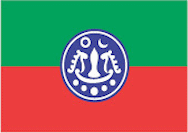Rohingya - Background
 Located mainly in Arakan State, Burma's Muslim Rohingya minority is subjected to "severe legal, economic, and social discrimination," in addition to the forced labor and other abuses commonly faced by the country's other ethnic minority groups, according to the U.S. State Department human rights report.
Located mainly in Arakan State, Burma's Muslim Rohingya minority is subjected to "severe legal, economic, and social discrimination," in addition to the forced labor and other abuses commonly faced by the country's other ethnic minority groups, according to the U.S. State Department human rights report.
Rohingyas lack citizenship, making them ineligible for public education beyond the primary level and for most civil service jobs. The government denies citizenship to Rohingyas on the ground that their ancestors did not live in Burma at the onset of British colonial rule in 1824, as required by Burma's restrictive citizenship law. It says the Rohingyas are Bengali migrants from neighboring Bangladesh who came to Arakan State to find work.
Moreover, Rohingyas must get permission from township officials to leave their village areas. Authorities generally do not allow Rohingyas to travel to Rangoon, although some Rohingyas obtain permission by bribing officials.
Rohingyas also face particularly harsh demands for forced labor. The Shan Human Rights Foundation and numerous Rohingya men say male Rohingyas must provide the army with up to 10 days of labor each month, the U.S. State Department report said. They are forced to carry food and ammunition under brutal conditions or, occasionally, to build Buddhist pagodas. Rohingya do not dispute their origins from present-day East Bengal but hold that they have resided in present-day Burma for decades if not centuries and thus deserve citizenship. Authorities usually referred to Rohingya as “Bengali,” claiming that the Muslim residents of northern Rakhine State were illegal immigrants from Bangladesh or descendants of migrants transplanted by the British during colonial rule.
Two lesser forms of citizenship exist, associate or naturalized citizenship; these citizens are unable to run for political office, inherit land or money, or access the full range of educational opportunities. Sources reported that Rohingya in northern Rakhine State who applied for naturalization with all required documents did not receive replies. Lawyers and activists noted that some Rohingya could also secure naturalization or “associate” citizenship through bribery or by registering themselves as a recognized ethnic group such as the Kaman.
Rohingya experienced severe legal, economic, and social discrimination. The government required them to receive prior approval for travel outside their village of residence; limited their access to higher education, health care, and other basic services; and prohibited them from working as civil servants, including as doctors, nurses, or teachers. Authorities required Rohingya to obtain official permission for marriages and limited the number of children that could be registered. Authorities singled out Rohingya in northern Rakhine State to perform forced labor and arbitrarily arrested them. Restrictions impeded the ability of Rohingya to construct houses and/or religious buildings.
Certain townships in Arakan State, including Thangwe, Gwa, and Taung-gut, are "Muslim-free zones" in which Muslims may not live, according to the U.S. State Department's October 2001 report on international religious freedom. In these areas, security forces have destroyed mosques and confiscated land from Muslims.
|
NEWSLETTER
|
| Join the GlobalSecurity.org mailing list |
|
|
|

